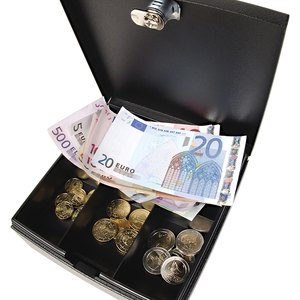
Traveling to Europe means changing currency. Seventeen European countries use the euro; the United Kingdom (England, Scotland, Wales and Northern Ireland) use the pound sterling. Iceland, two Nordic countries (Denmark and Sweden) and many countries in central and Eastern Europe still use local currencies. In general, exchanging money in Europe is better than doing so in the U.S.; however, having a small amount of local currency in your wallet when you land at the airport makes sense.
Ways to Exchange Money
The primary ways to exchange money are to use your credit or debit card to make purchases, use ATMs to get local currency or take dollars to banks or exchange businesses in the U.S. or Europe to change into local currency.
Credit Cards
The lowest currency conversion rates (2 to 3 percent) typically happen when you use your credit card or branded debit card (Visa/Mastercard/Amex) to make purchases. That's one reason why waiting until you arrive may be more cost-effective than changing money in the U.S. However, many credit card issuers also charge international transaction fees. Your issuer can tell you this before you leave; be sure to add this when determining the cost of converting your money. Although using a credit card for purchases is a lower-cost option, using one to get cash is expensive; in addition to ATM fees, international transaction and conversion fees, you will receive a cash advance fee.
ATMs
Another way to change money within Europe is to use your ATM card to get cash. Generally the rate is more favorable than using a bank teller, but not as favorable as using a credit card for purchases. Some large U.S. banks, such as Bank of America, have international partners so there's no fee for using ATMs at partner banks. Other banks may allow some fee-free transactions at ATMs in foreign countries. You can find out your bank's fee structure and conversion rate for ATMs before you leave.
Banks
Even if you want to exchange cash, it's generally better to do so in Europe. An exception would be if you believe the dollar's price will drop sharply while you're gone and you want to exchange before you go. Bank rates will vary and are on display in the street windows or near the teller window. To compare, look at the rate at which banks are buying U.S. dollars. Because banks offer better rates than exchange companies, such as those at train or plane stations, you may want to exchange a small amount in the U.S. so that you will have some cash on hand, especially if your bank charges high ATM fees.
References
- Reids Guides.com: How to get money when traveling
- Independent Traveler.com: Get the Best Exchange Rate
- NBC News.com: Traveling abroad? How to exchange currency
- The Savvy Backpacker.com: Using Money In Europe: ATMs, Credit Cards, Debit Cards, Exchange Rates, Currency Confusion and More
- European Commission: Economic and Financial Affairs
Writer Bio
Randi Hicks Rowe is a former journalist, public relations professional and executive in a Fortune 500 company, and currently a formation minister in the Episcopal Church. She has been published in Security Management, American Indian Report and Tech Republic.She has a bachelor's in communications, a master of arts in Christian education and a master of business administration.

